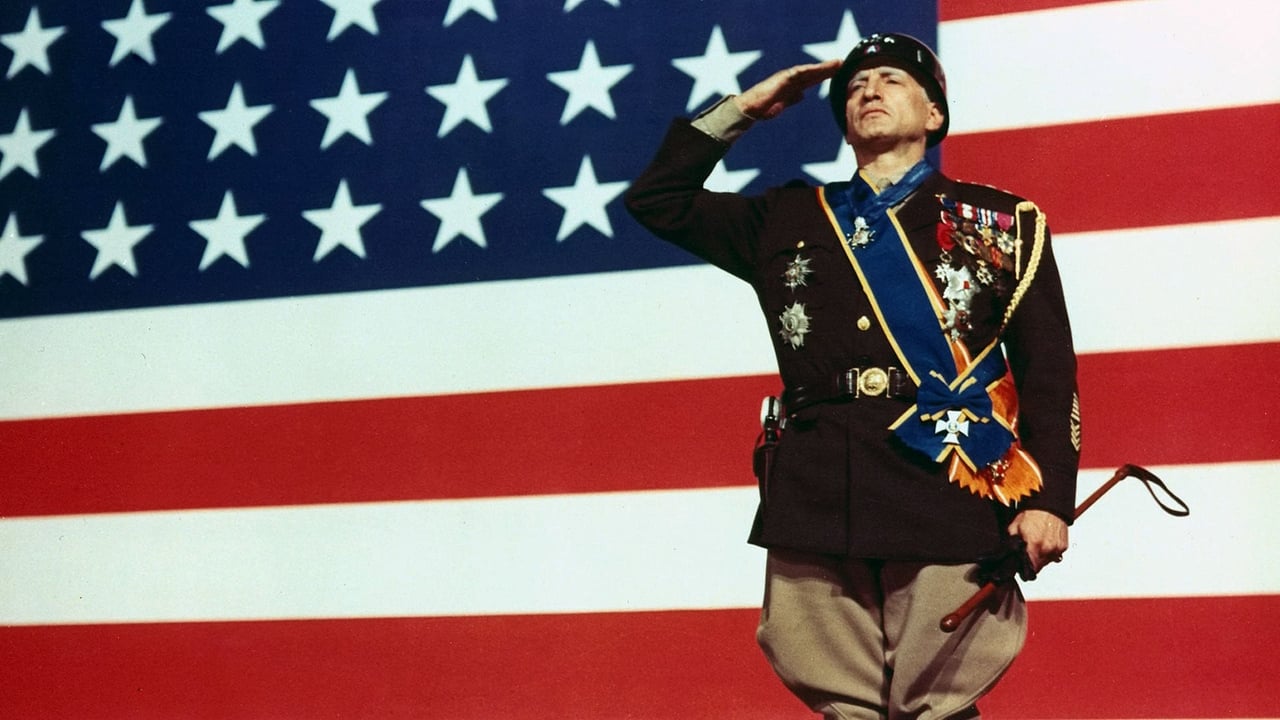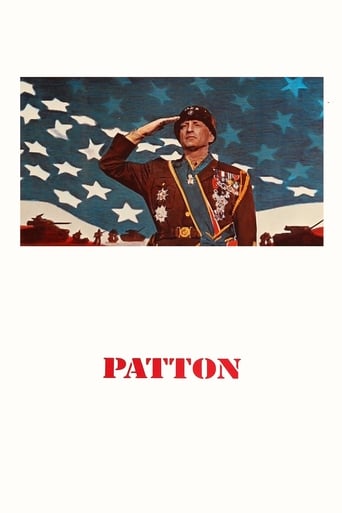Incannerax
What a waste of my time!!!
Colibel
Terrible acting, screenplay and direction.
Brightlyme
i know i wasted 90 mins of my life.
CrawlerChunky
In truth, there is barely enough story here to make a film.
merelyaninnuendo
Patton3 Out Of 5Patton is a character driven feature that follows up its characters like an irrevocable command. The work that went behind writing just the protagonist clearly pays off, for it is the only thread that one wants to hold on to in this overstretched journey and boy what a thrilling ride it has to offer. It is rich on technical aspects like costume, production and art design, sound department, cinematography and editing. The camera work is stunning, it is shot beautifully with amazing locations and visuals that endorses the feature. The screenplay by Francis Ford Coppola and Edmund H. North, is electrifying and smart if not gripping and the only reason to that would be the overlong runtime that it ticks for which seems inessential at certain points. Franklin J. Schaffner; the director, is in his A game and has done an excellent work on executing the feature which could have easily been blunt and disenchanting and the key to that would be the sense of urgency that is created to bind it all. The performance objective is scored majestically by the protagonist George C. Scott and Karl Malden in his supporting role. Patton is a self-challenged and self-motivated feature whose protagonist justifies its title like never before.
Wuchak
RELEASED IN 1970 and directed by Franklin J. Schaffner, "Patton" stars George C. Scott as the charismatic general during his WWII campaigns in North Africa and Sicily, as well as France & Germany following the Normandy invasion. After the invasion of Sicily, Patton was reprimanded for slapping a cowardly soldier suffering battle fatigue (in real life it was two soldiers on separate occasions in the course of eight days in August, 1943). The fiery general was removed from command for eleven months while his junior in age and rank, Omar Bradley (Karl Malden), was selected to command the First United States Army for the invasion of Normandy.Meanwhile, Patton was assigned to London as a decoy to deceive the Germans in a sham operation called Fortitude. The ruse was successful because the German High Command respected Patton more than any other Allied commander and deemed him crucial to any plan to invade mainland Europe. Immediately following the successful invasion, he was put in command of the Third Army in the final Allied thrust against Germany where the headstrong general, once again, proved his mettle as his forces favored speed and aggressive offensive action.Patton was an interesting character who maintained a flashy larger-than-life image in order to encourage his troops; and he didn't hesitate to get his hands dirty with them. While other officers tried to blend-in with the troops on the battlefield, Patton brazenly displayed his rank insignia. He was a romantic who valued bravery and tenacity above all. All this is effectively conveyed in this ambitious war flick. It's interesting to observe the North African and European theaters of the war from the standpoint of the Allied generals, mostly Patton and Bradley, rather than the typical perspective of the infantry.THE FILM WAS WRITTEN by Francis Ford Coppola with additional material from Edmund H. North (based on the factual accounts of Ladislas Farago & Omar N. Bradley). It runs 172 minutes and was shot in Spain, Algeria, Morocco, Crete and England, with the opening speech filmed at Bob Hope Patriotic Hall in Los Angeles.GRADE: A-
gab-14712
For those who know a little history, you would know who General George S. Patton is. You would know that he is served in World War Two as one of the top American generals on the European battlefront. He was a very smart man, but also an eccentric man. His eccentric manners is what took him away from taking part of D-Day. But there is no denying the influence he had on the war. Without his leadership, who knows how the war would have turned out. In 1970, a movie about his life came out and it was well-received by nearly everyone who has seen it. The movie was worked on by close associates of Patton, such as General Omar Bradley. An interesting fact is the producers of the film contacted the Patton family for information…..only a day after Patton's widow was laid to rest so it's a sad matter-of-fact that the producers didn't get any help from Patton's family. I remember vividly looking forward to this movie, and luckily I can join the crowd of people who adored this film.From the moment I see George C. Scott walking onstage as Patton to deliver his iconic speech in front of a sprawling American flag, I knew this was going to be a great movie. Every scene is captivating especially when Scott is in it, but the opening scene is the greatest, most powerful scene in the movie. The above quote I featured is part of the speech and immediately you can tell what kind of man Patton was. Patton was a man who took no crap from anybody and was a man who dearly loved his country. He spoke with such colorful language (although that idea was exaggerated in the film) and he had a way to make those words count. He was a man of perfection. You can see that during a scene where he slaps a soldier for being in a hospital for depression instead of battle injuries. That caused him a fall from grace, but you can see the man Patton was. The movie does an exemplary job in making Patton a lifelike character on the big screen.This isn't your typical birth-to-death biography. This is a biography that covers Patton during the wartime years. The movie makes a point in showing what a fine general he was and how he positively contributed to the war, but it did not hold back on showing him as an eccentric man. The scenes where he drags his very scared puppy around everywhere he goes is just one of those examples. The film begins with his conquests in Libya as he drives German general Rommel out of the country. Then we see a downfall of his due to his big mouth and incident where he slaps the soldier. Then we see a comeback as Patton commands the Allies on the European front mowing down Germans left and right as they move closer to Berlin.The main actor in the film, of course, is George C. Scott who delivers a splendid performance as Patton. In fact, this may be the best performance of Scott's long career and he had a wonderful career. The performance works on various levels. Scott is an on screen presence to be reckoned with and he follows the oldest rule in the acting handbook-to become the character. I felt I was watching Patton the entire time, despite the mannerisms of Scott. But also you can draw parallels between the two men. Scott is seen as a recluse in Hollywood because he was so eccentric. He had the extreme talent, but his personality made him like an outcast. It was a foregone conclusion he was going to win the Oscar for Best Actor (and he did), but the question was if he was going to personally accept the award. He did not stating he did not like the Academy or acting competitions in general. Scott and Patton would have been great blood brothers. Casting Scott to play Patton is one of cinema's greatest casting decisions ever. Scott delivered such a powerful performance. The other main performance was Karl Malden who delivers an admirable performance as General Omar Bradley, the man who gave Patton a second chance in the war.Patton is a long film as it clocks in nearly three hours long and Scott is in nearly every frame, but it works very much thanks to Scott's layered performance enhancing upon Patton's theatricality. The guy who possesses such bravery also loves to hear himself speak during his long-winded speeches. The movie has many speeches, but they are worthy of your attention. The guy gives such a commanding presence and I got the goosebumps during that opening scene. The movie sees the war the way Patton saw it and it's an exhilarating experience.The direction is also a highlight of the film. Franklin J. Schaffner is known for taking on ambitious projects and this may have been his most ambitious project he may have ever tackled. It's fun to see directors rise to the challenge and Schaffner took a mighty challenge here and won. Also a noticeable presence was the score by Jerry Goldsmith. He created such a patriotic score with the help of a pipe organ. Every time I think of Patton himself, the main theme becomes stuck in my head and that is a good thing. 1970 was a good year for war films. M.A.S.H and now Patton are must-see war films from that year. The former film was a spoof on the dangers of war, but the latter is about a man who dedicated his life to winning the war his style. And his style is very interesting to watch. A man who won't back down from anything. Because of George S. Patton, the Allies won the war.My Grade: A
ncleasure
The film Patton was made during the film drought of the 70's and it suffers from that. Yes few good films came from this time period for the same reasons this is as bad as it is. To begin with, there are so many factual and anachronisms in the film it is mind boggling how the director took a good look at the cut and said "Yep, that's the best I can do." for example, the tanks used for the film were either the M,41,46,47,or 48. Ironically, these tanks were known as the Walker (M41) and Patton (M46,47 and 48). Also, they all debuted following WW2, and in respect of the Walker, not until midway through the Korean War. Another major problem is the directing aspect. Continuity errors and other goofs abound, unacceptable and unprofessional. In total, IMDb holds a total of 81 goofs and errors, there are probably more in there somewhere, I wouldn't be all that surprised if there were. However, by dislike of this film is not limited to the factual and historical errors, my being a college history student, this would be enough for me to black-ball it. Patton also has quite wooden acting, almost canned bits by Bradley (Malden) when he first meets Patton in the HQ. The sole exception to the is Patton (Scott). But even he on occasion has a pause or two were likely him trying to remember his lines and not dramatic. The worst part of this it is not a true biographical specimen like it is touted as. The biggest slight on history is it does not detail the untimely death of Patton. If you want or need a biographical account of Patton for something like an assignment, steer clear. If you are a historian, steer clear. If you are a WW2 movie fan, consider it. If you have no idea what WW2 is and want to learn something about it, read a history book, Killing Patton is a good example. I think that this should be remade with modern practices and standards, it would be quite good. I think Harrison Ford would be good for Old Blood and Guts if he gained five pounds.

